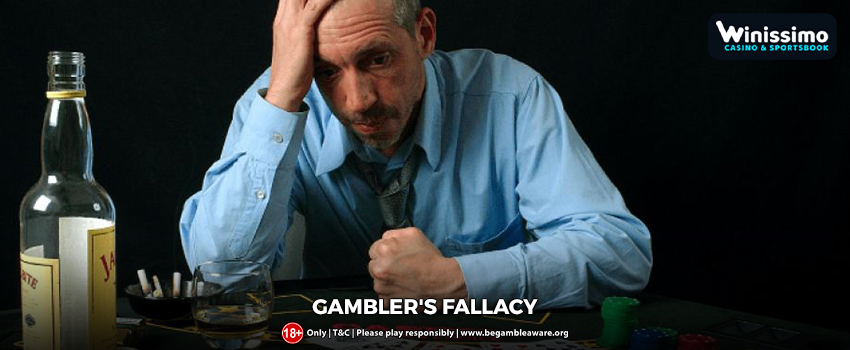Gambling has managed to bring in common themes and beliefs thereby prompting players to follow a particular routine that they believe will bear fruit. While some work, others fail like they were meant to fail. That is where Gambler’s Fallacy comes into the picture.
Although it has been around for long, it still aims to create an impact with the player and keeps them hooked on to something in particular. But what is it and should you avoid it? Well, let’s learn more about Gambler’s Fallacy and answer all these questions.
Exploring Gambler’s Fallacy
Gambler’s Fallacy is nothing but an idea or the mistaken belief that events of the past bear an impact on the future. It stands strong on the belief that something happening less frequently than normal in the past will happen more frequently than normal in the future and vice versa.
So according to the Gambler’s Fallacy, if a roulette wheel keeps on landing on black for a lengthy period of time, it will hit red on the next spin or somewhere down the future.
While it may have happened with players, it is still far from being called a fact. Gambler’s Fallacy is a mistaken belief and adjusting your playing routine to suit this belief is not a great idea. Because the concept does not stand true with time, especially for an activity as risky and unpredictable as gambling.
Hence, it has come to be known as a belief and nothing else, making it important for you to never fail for the same. However, the idea or the belief was grown through a real incident that took place in August of 1913 at Monte Carlo Casino. The roulette ball stopped on black over 26 times in a row which naturally made gamblers lose a lot of money.
Due to that, Gambler’s Fallacy also goes by the name Monte Carlo Fallacy.
Examples of Gambler’s Fallacy
Examples help us understand things with ease. Be it Gambler’s Fallacy or even an activity like online betting, we require examples in order to facilitate the definition and meaning of the same. So here are a few examples of Gambler’s Fallacy.
- A coin flip

Since Gambler’s Fallacy occurs for activities more than just gambling, we can take the basic example of a coin toss. When people flip a coin and it lands on heads face-up about three to five times, we get a general belief that the next move will be tails. Moreover, some of us would also be convinced that the occasional landing on heads will eventually lead to it landing on coins.
Since this is nothing but a belief, the next move could be unpredictable and will go anywhere between the two options.
- Sports
Sporting events like football also bring in a few circumstances that make people believe that Gambler’s Fallacy is close to reality. Let’s consider the head-to-head record between clubs like Liverpool and Blackburn Rovers. Since Liverpool is the dominant team, the Reds will have a better record against Rovers and for this example, let us even believe that Liverpool has beaten Rovers 12 straight times.
So if Gambler’s Fallacy had to be roped into this situation, it would suggest that the next game between Liverpool and Blackburn Rovers will see Rovers win the game. Sports fans or football fans will know that this is not true because winning a game depends on several other aspects.
From match statistics to tactics, clubs bring in different elements to try and defeat the game plan of their opponent. So Gambler’s Fallacy has no value in the world of sports and following the same to complete activities like sports betting is a huge mistake.

Important tips to avoid Gambler’s Fallacy
Considering the fact that avoiding Gambler’s Fallacy is as important as forming a betting strategy, you need a few tips to get things going.
- Go behind logic

The easiest way to avoid Gambler’s Fallacy is to opt for the logical explanation, which seems to be the thing that we keep on avoiding. Because if we were to trust logic and understand the situation, we wouldn’t have opened the door for ideas like Gambler’s Fallacy. So consider the importance of logic and look towards exploring the activity in a manner that makes sense.
- Understanding the upcoming step
Since being aware of Gambler’s Fallacy is not enough to avoid it, you need to do something different. For example, understand the upcoming move or step in detail to prevent your mind from thinking about Gambler’s Fallacy. If a certain dice landing on double 6’s several times prompts you to think about it landing on double 6’s again, acknowledge that the next move is free of the former one.
Every roll of the dice is independent and does not showcase an impact from the previous roll. Moreover, there is no specific way for it to follow Gambler’s Fallacy, making it a belief and not a proven strategy.

Gambler’s Fallacy & Pop Culture

There are several instances where pop culture entered the mix and decided to bring in references to Gambler’s Fallacy. From Television shows to Comic books, there are several hints of this sort and by reading more about them, we tend to receive a different take on the subject.
- Somebody remember a certain episode of Law and Order
American hit drama series Law and Order, went as far as featuring an episode called ‘The Gambler’s Fallacy’ back in 2014. The episode saw its leading character and detective Amanda Rollins step into several gambling houses only to come out as a loser.

-
Lucy and Charlie Brown

Fans of Peanuts comics or several other such cartoons will remember Lucy and Charlie Brown including how Lucy puts the football away from Brown when he comes up to kick it. Since Brown understands the situation, he passes on from kicking the ball which makes Lucy use the Gambler’s Fallacy in order to convince him that one day she won’t be putting the ball away when he comes to kick it.

